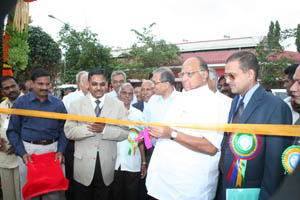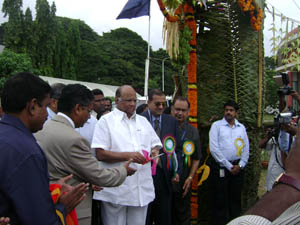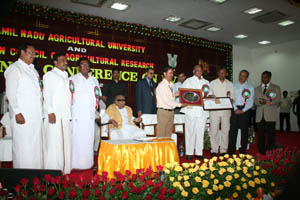Inaugural Address by Shri.Sharad Pawar Honourable Union Minister for Agriculture, Consumer Affairs, Food & Public Distribution on the occasion of Fourth National Conference on Krishi Vigyan Kendra Government of India at Tamil Nadu Agricultural University, Coimbatore
on November 6, 2009
Honourable Chief Minister of Tamil Nadu Dr.M.Karunanidhiji, Shri.Veerapandi Arumugam, Minister for Agriculture, Government of Tamil Nadu, Dr.Mangala Rai, Secretary, DARE and Director General, ICAR, Dr.P.Murugesa Bhoopathi, Vice-Chancellor, Tamil Nadu Agricultural University, Coimbatore, Dr.Kiran D.Kokate, Deputy Director General, (Agricultural Extension), ICAR, other dignitaries in the auditorium, dear delegates from different parts of our country, members from press and media, ladies and gentlemen.



- It gives me immense pleasure to be with you during this Fourth National Conference on Krishi Vigyan Kendras, an important occassion in which 569 KVKs have united to share their past experiences and get scientific input to function as knowledge and resource centre of agricultural technologies at the district level.
- At the outset, I congratulate the KVKs of Erode, (Tamil Nadu), Satna (Madhya Pradesh) and North Goa (Goa) for achieving the distinction of being best KVKs in the country and bagging the National Best KVK award for the year 2008-09. I am sure they will continue with the same spirit and I wish all the KVKs to make efforts for excellence in espousing the cause of the farming community.
- On this occasion, I feel much privileged to share the dias with one of the senior most public personalities of the country Dr.M.Karunanidhiji, Honourable Chief Minister, Government of Tamil Nadu, who took consistent and strenuous efforts to make Tamil Nadu as one of the most prosperous agricultural state in the country. I am happy to state on this occasion, under his governance, Tamil Nadu realized the highest productivity in crops such as sugarcane and coconut in the country and the productivity levels of other crops such as paddy, maize, groundnut, sesame, black gram and green gram is well above the average of national productivity. I congratulate the Chief Minister, the Agriculture Minister and the efforts of Tamil Nadu Agricultural University, State Department of Agriculture and above all, the sincere and hard working farming community of Tamil Nadu.
- Indian agriculture has registered a phenomenal growth during the last four decades. The production of major agricultural commodities such as food grains, vegetables, fruits, milk, eggs and fish has increased several folds. As a result, the per capita availability of important food items has increased despite increasing population. However, the share of agriculture in national GDP and in the employment has reduced from 51% and 72% to 18% and 52% respectively during 1951-2008. The ratio of agricultural land to agricultural population has shrunk to 0.3 ha per person in India as compared to over 11 ha per person in the developed countries. The resources are therefore getting marginalized and there is tremendous pressure on natural resources with diversion of agricultural land, water and labour towards industrial, urban and non agricultural sectors.
- Food security is one of the major concerns. India’s population during the last three and half decades (1972-2007) increased from 551 million to 1122 million, which implies that country had to feed double the population in 2006 and 2007. Production of most of the food items increased more than double which contributed in improving per capita availability of all food commodities except pulses.
- It is important to note that the increase in production has been much higher for horticulture, fish and livestock products as compared to food grains, which helped in improving nutritional security. Past achievements are very impressive by any yardstick but per capita consumption of most of the food items in the country is quite low compared to requirement of nutrition food. More than one fifth of our population is still undernourished in terms of simple energy and protein intake.
- Last year has been phenomenal in terms of producing highest food grains (234 million tonne). However, the projections indicate requirement of 281.1 million tonne of food grains in 2020-21. Likewise, there is growing demand for milk, vegetables, fruits and sugar therefore, efforts need to be initiated to augment production of these commodities.
- Regional disparity is another important issue that needs serious attention. Targeting rainfed and ecologically marginal areas for dissemination of improved technologies and development of markets would help in reducing regional disparities.
- Deteriorating soil and water resources are posing serious problems and are adversely affecting agricultural production. Combating degradation of soil and water resources is more important while improving input use efficiency. Conserving and augmenting natural resource base is a pre-requisite for higher agricultural growth.
- The deforestation, desertification and soil erosion are also disrupting carbon cycle and resulting in decline of soil-carbon stock especially of soil organic-carbon, thus, deteriorating chemical, hydrological and biological environment of the soil. The impact of climate change would also be reflected on crop yields. Climate change is likely to affect global cycles of carbon, nitrogen, water and oxygen, thereby, distorting structure of ecosystems and disrupting or diminishing effectiveness of their auto-functions. As predicted, global warming will intensify hydrologic cycle resulting in more intense rains, frequent floods and droughts, shifting of rainy season towards winter and significant reduction in mass of glaciers causing more flow in the initial few decades, followed by substantially reduced flows thereafter.
- In view of this, agriculture is being accorded top priority in the country. The Central Government so as to take up scientific and technological interventions for higher agriculture growth. Rashtriya Krishi Vikas Yojana (RKVY) has been launched with an outlay of Rs.25,000 crore for holistic development of agriculture in the XI Plan. National Food Security Mission (NFSM) has been launched with an outlay of about Rs.5000 crore to enhance production of rice, wheat and pulses by 18, 8 and 2 million tones, respectively, by the end of the XI plan. In addition to such policy and development initiatives, sincere efforts of the researchers, educationists and extension personal are the need of the hour. Our goal of attaining 4% agriculture growth rate during the XI Plan needs concerted efforts by improving water management, focusing on soil quality, diversifying into high value agriculture, promoting animal husbandry and fishery and improving marketing systems and strengthening effective extension system.
- Among important technological inputs, seed is most important and viable option for filling the yield gaps visible across different parts of the country. ICAR made good initiatives with Mega Seed Project leading to building of infrastructure support at State Agricultural Universities and ICAR Institutes. However, it will be further appropriate to intensify quality seed production and planting material production on large scale to meet the requirement.
- Agriculture has become more challenging and market driven and therefore, farmers need orientation in production system, agri-business, marketing and establishing forward and backward linkages with numerous partners. Therefore, empowerment of farmers in knowledge and skill has become very vital. KVKs have been significantly contributing through technical back-stopping in capacity strengthening by conducting numerous on-farm trials, frontline demonstrations and trainings. Besides, KVKs have also produced the critical technology inputs like seed, planting material, organic products, fingerlings and livestock, piglets and poultry strains for availability to farmers.
- ICAR has been making all efforts to strengthen KVK system and as a result the number of KVKs has increased from 273 in IX Plan to 569 in XI Plan. Since the second conference, there has been significantly higher budgetary allocation for the activities of the KVKs. Besides, support to the directorates of extension of SAUs has been continued for knowledge empowerment, technological back-stopping and human resource development. The facilities of farmers hostel created at the main campus of agricultural universities will help for wider exposure of the farmers to the latest agricultural technologies after their training at KVKs.
- Further as a supportive measure to strengthen the KVK system, ICAR has upgraded all its eight Zonal Coordinating Units to Zonal Project Directorates as it was emphasised in the last conference and I congratulate Dr.Mangala Rai, Secretary, DARE and Director General, ICAR for the same. I am sure, this upgradation will further strengthen the functioning and effectiveness of KVKs for the cause of farming community.
- In addition to the provision made available for the establishment of basic infrastructural facilities required for the KVKs, an amount of Rs.3912.4 lakhs have been made available in the XI plan to establish new facilities such as Soil and Water testing facilities, Rainwater harvesting structures, Plant health diagnostic facilities, minimal agro-processing facilities, Portable carp Hatcheries, and Integrated Farming System units, in the KVKs across the country. I believe that these initiatives will strengthen the KVKs a great extent in performing their role as resource and knowledge centre. The e-connectivity facilities established in the 192 KVKs and 8 Zonal Project Directorates across the country is going to be operationalized shortly for the speedy dissemination of knowledge to the farmers and other stakeholders.
- Based on agricultural management plan developed by Council and contingent plan developed by State Agricultural Universities, KVKs provided weather based agro-advisory message on day today basis to the farmers and other stakeholders during kharif drought situation of this year. Subsequently, KVKs have to implement measures to maximize the production of various crops during Rabi season, by advising the farmers for cultivation of proper high yield varieties / hybrids and ensuring the timely availability of the seed materials. Further, need based technical advice can be given on Integrated Crop Management practices for these crops. In addition, emphasis needs to be given on realizing higher Water Use Efficiency through judicious use of available water for irrigation.
- In this context, the KVKs have to work as resource and knowledge centre may play significant role in empowering farmers. For KVKs to efficiently work as knowledge and resource centre, State Agricultural Universities need to take up the role of technological back-stopping to KVKs more seriously than ever before.
- In the present context, I consider the theme of the Conference as timely and appropriate in quest of enhanced agriculture growth with sustainability and equitability. I hope that the Conference will focus on many issues for empowering Krishi Vigyan Kendras so that they could empower the farmers.
- With this, I take my privilege of inaugurating the Fourth National Conference on KVKs in the presence of my friend Dr.M.K.Karunanidhiji and wish all success for the conference.
Thank you








Like on Facebook
Subscribe on Youtube
Follow on X X
Like on instagram